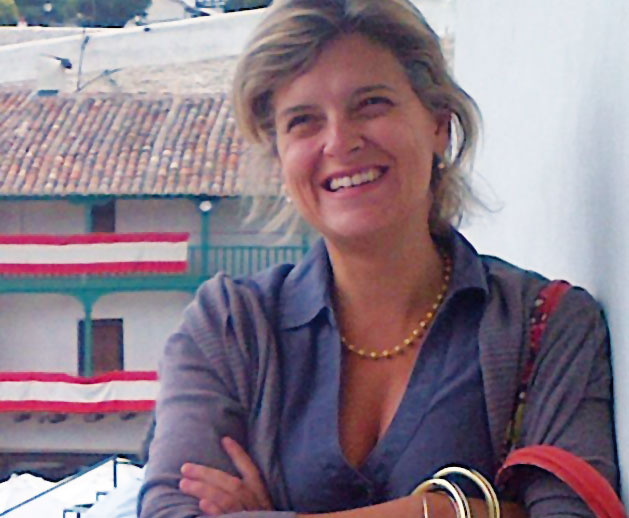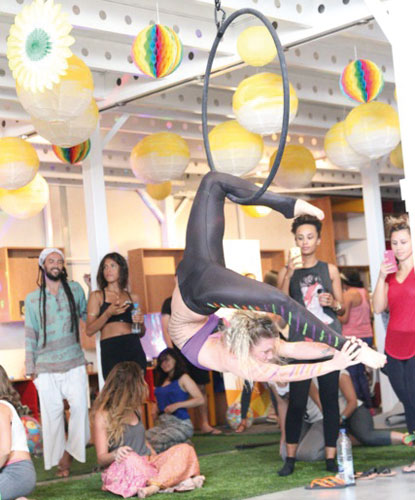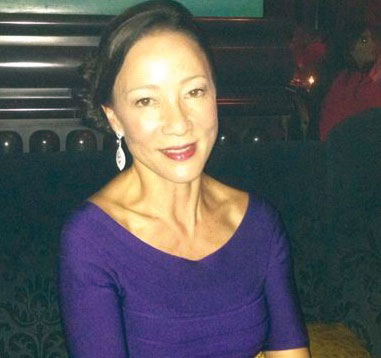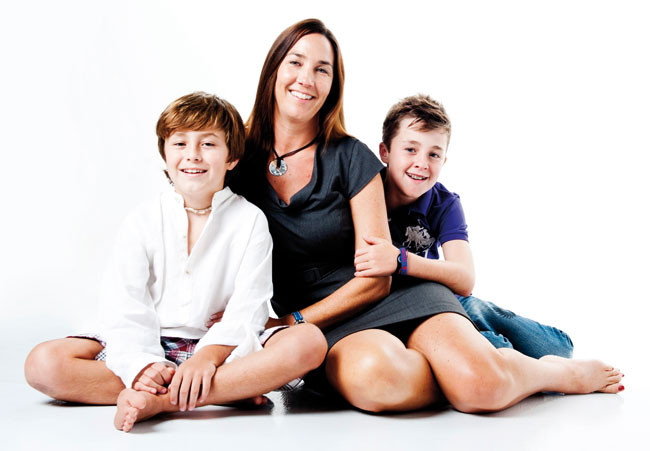The term third-culture kid (TCK) refers to children who grow up in a different culture to that of their parents. The mixing of cultures they experience creates a new, third - and often unique - culture. Born and raised outside of their homeland, these individuals often have little connection to their nationality. By the time they reach adulthood, these TCKs have developed a sense of familiarity with all the cultures they have brushed with, while not taking full ownership of any. Some suffer an identity crisis and long for a sense of belonging; others excel as true citizens of the world. The cultural melting pot of Dubai is full of adult TCKs who have been shaped by a lifetime of being on the move.
Luiza Wolfs, 44
Doctor and clinical research manager

"My parents are Portuguese but I was born in Mozambique. We left when I was still a baby and moved to London then 'home' to Portugal. My mother remarried and from there we relocated again to the Netherlands. By the time I was 15 and living in France, I had resided in four different countries - all and none of them were 'home'.
"I speak four languages - Portuguese, French, Dutch and English - fluently, but as my mother passed away while I was young, I don't really feel I have a 'mother tongue'. Although I speak many languages, I have an accent in every one. I'm comfortable in all the cultures attached to the languages I speak, but I have never felt as if I totally belong in any of them.
"I dread people asking me 'where do you come from?' What they really want to know is what country do I identify with. It's as if coming from a certain country determines who I am. I honestly can't say where home is and some people are not comfortable with that.
"I see myself as a sort of cultural chameleon. Moving around so often has equipped me with a unique set of life skills. Not identifying with any particular country makes me more open to absorbing other cultures with a depth that no book or school could teach. I don't necessarily 'see' ethnicity, skin colour or even gender, instead I respond to people as fellow human beings. For me, home is the entire world because home means familiarity and comfort. I am most familiar and comfortable in the unknown.
"My husband also shares my sense of belonging everywhere yet nowhere. He was born in the Philippines to a South African mother and Dutch father. The last place we lived in was Australia. We have three daughters and we recognise in them a searching for something familiar, which is why we bought a holiday house in France - we all love it there but we still don't call it 'home'. We tell our girls that home isn't necessarily somewhere physical. Home is a sense of ease; it's where you feel understood. To me, it's not a place, it's about finding it within."
Francesca Carlson, 26
Personal trainer and pole fitness instructor

"I was born in the UK. My father worked in IT and covered the MENA region. Since I was three years old, we lived and travelled throughout the Middle East. I started school in Dubai then we moved to Turkey, Greece and back to Dubai where I have stayed for the majority of my life. About six years ago my family moved back 'home' to the UK - for good. I followed and studied at university there, but it felt like a foreign country. I graduated but couldn't wait to leave. I felt out of sync with everyone else, uncomfortable, unaccepted and foreign. I didn't fit and I didn't belong. It was a bit of an identity crisis for a while because my so-called home certainly didn't feel like it."
"So, where is my home? Although I'm not from here, I've lived in Dubai for 20 years now and consider this to be my home. I feel safest, happiest and totally in touch with myself right here. My home is not my passport; it's where I feel I belong, and that's here. It feels familiar for me to be surrounded by other nationalities; I see ethnic differences as exciting not isolating. Cultural disparities are to be discussed and celebrated, not judged or whispered about."
"Occasionally, people comment that they feel sorry for me. They say it's sad that I don't have a family home full of childhood memories or a real sense of belonging anywhere. I don't see it that way at all. Being international is who I am. The world is my home. I'm privileged to belong to the new generation of Dubai. I surround myself with friends who, like me, are global citizens. This is where I feel individual, unique and at home."
Jojo Southwell, 44
Banker

"My father is Chinese Malay and my mother is Chinese Scottish. I was born in Borneo but when I was three, my parents separated and my mother took us to Hong Kong where I spent the majority of my primary school years. My parents were reunited again when I was nine so we returned to Borneo. Our village had very limited schooling so at ten years old, I was sent to boarding school in England. I met my husband, an Englishman, in London and we now have four children. Since being married we have moved home 12 times in the past nine years."
"We were living in Hong Kong when our eldest son - then fours years old - contracted the mosquito-borne disease Japanese encephalitis. His condition went misdiagnosed and by the time he slipped into a coma, brain damage had already occurred. I moved to London with him for several years of specialist rehabilitation. He has come a long way but life will never be easy for him, he will never talk properly and walking is difficult. Now, as a mother to a special needs child, my views on 'home' have once again changed. I've realised that familiarity, support and my sense of identity come from those around me rather than my geographical location."
"One quirky impulse I have picked up during my nomadic existence is a nesting syndrome. Perhaps because I don't have a family home as such, I have an overwhelming urge to make one wherever I happen to be living. Buying my own home is important; it gives me a sense of being rooted and belonging. It's my way of making my surroundings my own. If anything, being nomadic has made the bonds with my immediate family even stronger. We are dotted in all corners of the globe, but home to me is wherever we all come together. It isn't a destination; it's about being together."
Lise Stokes, mid 40s
Media consultant and polo player

"You could say I'm a second generation expat; I grew up moving countries often for my father's job. My mother was Irish, my father French and I was their only child born during a posting in Mexico. When I was four we left for Belgium where I spent the remainder of my childhood. I'm bilingual in both French and English and was schooled equally in both languages. Although I don't speak it, Spanish sounds familiar to me because of my Mexican nanny as a baby. For summer holidays I would alternate between grandparents in Ireland - where I forgot everything French, and France - where I forgot everything Irish."
"In Brussels, it is quite normal to mix with other cultures. Some of my earliest memories are of my parents' dinner parties where we welcomed many nationalities around the table. I knew nothing different; to be from somewhere else was the norm for me and as a child I was comfortable with that."
"I left Belgium for university in the UK at 18. For my eighteenth birthday present, my father paid for me to get my private pilot's license. I not only fell in love with flying, my British instructor later became my husband. We moved to Dubai 20 years ago and our two sons were born here. They too are bilingual. As future global citizens, we like to think they are 'from' France, Britain and Dubai, although I hope their upbringing has equipped them with the tools to feel comfortable anywhere in the world."
"I do recall a period of searching for some form of identity. At 19 I travelled the world looking for my roots. In doing so, I didn't find home but I did find myself. I learned that if you are comfortable in your own skin, then home can be anywhere you want it to be. Now when I travel, I feel as though I leave a little bit of myself all over the world. I also soak up bits from the various cultures I visit. Home for me is a finite thing. Right now it's Dubai but who knows where our future 'forever' home will be."